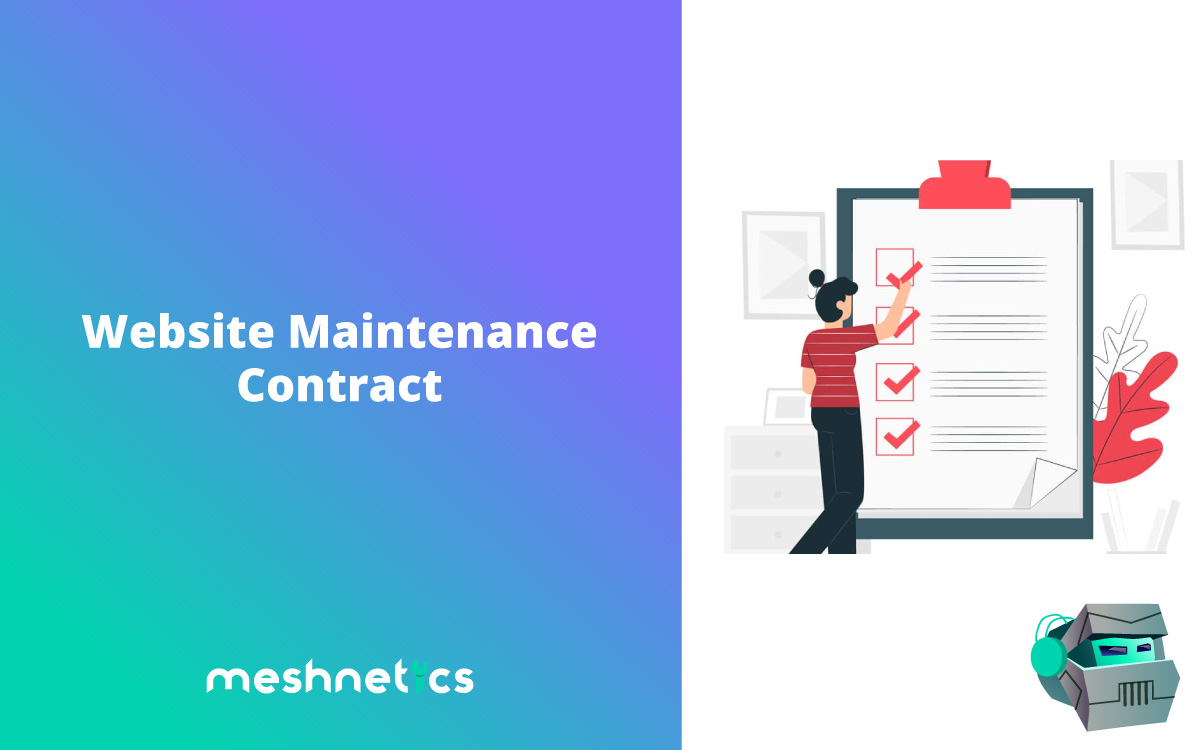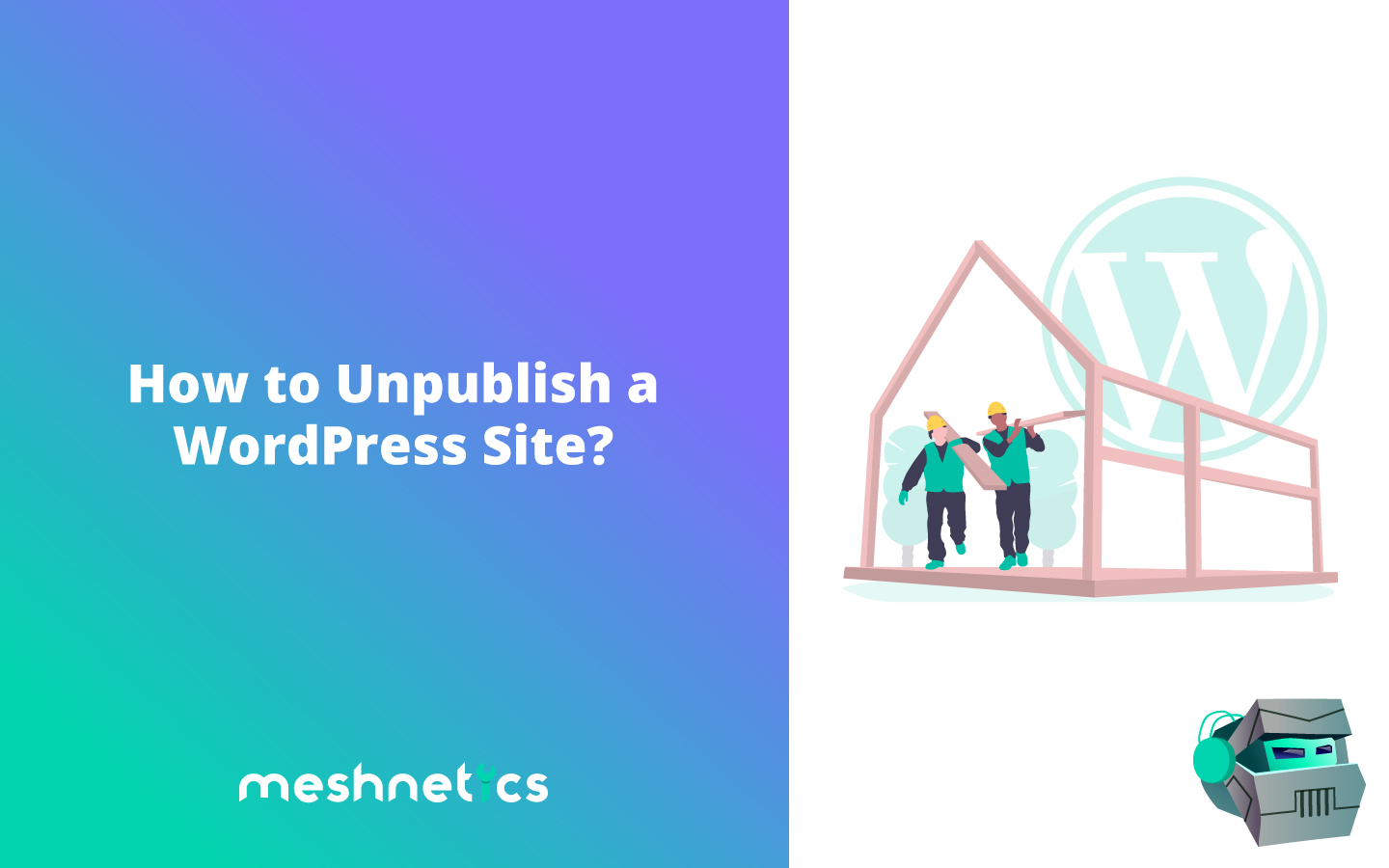Do I need a website maintenance contract for WordPress?
With so many ready-to-use WordPress themes, cheap hosting options, and skilled developers out there, starting a website has never been easier. But to keep it up and running is where the party starts. WordPress experts already know that you can’t just build a website and vanish. Well, you can but we wouldn’t advise it. Have in mind that most of your clients are business owners with zero coding knowledge. The last thing you want is to leave them frustrated once the first bug occurs. This is where maintenance of the website enters the scene and possibly creating a contract.
In an ideal scenario, once you build and launch a site, you will continue to maintain it so it remains secure and up-to-date. But before you get tons of questions and requests about services you don’t even cover, make sure you define all the aspects of your website maintenance package.
So, to prevent misunderstandings and uncomfortable surprises, create your website maintenance contact. It will not only save you tons of time and make you more effective but help you cover the specific needs of your customers. Also, you will be able to use it in situations when customers require additional support that’s not covered by your list of services. Plus, if your customers refuse to pay for some reason, you can use it for legal reasons.
Before we dive deeper into the website maintenance contract and analyze its essential elements, let’s first talk maintenance business and its potential in general.
What is website maintenance?

Only when runs smoothly, the site can leave a strong and professional impression. Frequent updates of its core, plugins, theme, or content are crucial for keeping it running without distractions. If you have proven knowledge and relevant experience with maintenance, why not turn it into an additional stream of income? Just offer maintenance services as a subscription, provide high-quality performance, and get paid at the end of each month.
Even if you sell just a couple of maintenance packages, it will boost your revenue in case it’s your side hustle. On the other hand, if this is your primary business, you will be happy to hear that you will probably collaborate with serious, professional clients. People who are ready to pay so their site runs smoothly will value your work for sure.
Finally, when you offer maintenance, you will carefully plan each step of site development. As a result, you will set standards not only as a maintenance expert but also as a web development guru. Before we explain the most important elements of the website maintenance contract doc, we difference between support, maintenance, and site enhancement.
Support teams
In a nutshell, support teams assist users with everything front end related. Of course, you can define the areas your team covers and describe each service in detail. Since most of your clients don’t have WordPress knowledge, they will rely on your support team. So, choose your employees carefully and make sure your response time is high.
Website maintenance
Maintenance is keeping the site up-to-date. From updating its plugins, core, and removing malware, it covers a broad range of services that will make sure the site operates smoothly.
Professional enhancement
Lastly, there is a site enhancement. Basically, it includes any major changes to the existing UI/UX. In most cases, due to its complexity, it’s charged as a new project.
How to create a website maintenance contract?

Transparency is the key to success in any business. When your clients know what to expect, they won’t require services that are not included in your website maintenance package. This will, furthermore, protect your reputation, and prevent any sort of potential misunderstanding. Start by creating a simple website maintenance agreement, but do your best to explain your scope of work in detail.
The good news is you don’t have to invent the wheel. Look for the examples on Google and get inspired by professional web maintenance contract PDFs you can adapt to your needs. Possibilities are endless, but if you don’t want to miss out on important sections, pay attention to your contract’s structure.
Contact structure and organization
Although you have complete freedom to organize your website maintenance contract as you please, there are some things you shouldn’t miss out on. Firstly, decide on which sections you want to integrate. If you don’t have an idea where to start, have a look at our selection of basic fields you should cover.
· Description of services: Also known as ‘Scope of Work (SoW)’. This section is an essential and most important part of your website maintenance contract. Here you describe each service you provide so clients exactly know what your responsibilities are.
· Payment: Define prices for your work. You can offer monthly, annual, or lifetime pricing plans. Also, don’t forget to include policies that regulate late or missed payments. This will save you the nerves in the future.
· Termination policies: Specify circumstances in which client or you can terminate the agreement.
· Ownership agreement: This segment defines the site’s ownership. Specify that your client will retain ownership of their site once the contract is over.
· Indemnity and liability: This part of the agreement is essential for preventing clients from holding you accountable in case something unpredictable happens.
· Dispute resolution: In a case, there is a disagreement between you and the client, you better have a set of predefined actions.
Define services you offer
As we already said, website maintenance includes versatile day-to-day actions that will make sure the site works properly. The list of services should fully be in line with your skills and expertise. So, don’t offer the things you know a little about. Instead, make sure everything you can cover is your professional area. In most cases, services are a combination of different clients’ needs. Here, we handpicked the most popular client’s requirements:
Website updates
Every website needs an update from time to time. Whether you can help with updating WordPress core, plugins, or themes, do it professionally.
Frequent backups
Backups are an amazing way to keep the website’s content or data safe. Help your clients by performing automatic or manual backups regularly.
Security services
Hacker attacks, malware, or viruses can seriously damage a site. If you can successfully monitor threats and attacks, integrate security fixes into your website maintenance contract.
Site monitoring
To run without limitations, the site requires constant monitoring. From fixing broken links and 404 errors to helping with speed issues – the list of things you can offer is long.
Consulting services
As an expert, you can monetize your knowledge through consulting services. Many WordPress beginners would be happy to boost their skills via Skype calls, Zoom meetings, or even email newsletters.
Marketing plans
Marketing is a powerful tool any business needs. In case your clients want to grow sales and strengthen their online presence, offer to manage their social media, create email campaigns, or set online ads.
Content creating
To rank good on Google, sites need fresh, quality content. Long, easy-to-read blog posts are the core of effective SEO strategies. Make sure the client’s site is powered with great content. Also, keep the content coming regularly – publish at least 1 or 2 blog articles per week. When it comes to SEO there is one rule you should follow – The more, the merrier.
How much does monthly website maintenance cost?

Creating pricing plans requires not only deep research but also realistic business goals. When you know your competitors, it’s easier to position yourself so you catch clients’ attention. Our general advice is to find the balance. Charge enough to be happy at the end of the month, but don’t scare clients off with pricing packages that are way beyond their budget.
Also, it’s better to go with versatile pricing models depending on the scope of work. This means you can provide extra services for higher rates. There will always be clients ready to pay more for additional maintenance and support options.
Now, let’s see how this works in reality. Based on the site type, your expertise, and the quality of services you provide, you may charge from $35 to $5000 per month. Try to be realistic and start with a package that is some sort of golden mean. Also, you can start with one pricing package and change it following the market’s trends or by extending the range of your duties and responsibilities as the time passes.
Determine the length of your website support and maintenance contract

The duration of the contract can help you organize your business better. For instance, if collaboration comes to an end at a certain point, you can always prepare in advance and get new clients on time. This will help you coordinate monthly projects better.
Also, you can always extend the contract if both sides are satisfied. For starters, try 3 or 6 month-long projects. It’s enough time to test whether you enjoy collaboration. Plus, during this period of time, you will be able to strengthen your reputation through the results and obvious improvements. Of course, you can go with annual contracts, if you already have good previous experience with some clients.
Don’t forget the legal part
The Internet is a great resource for inspiration. Plus, there are many great examples that can help you set the direction of your website maintenance contract. However, sometimes you can run into resources that can lead you in the wrong direction. So, if you don’t want to risk and leave nothing to chance, consult your legal adviser. This is the best way to prevent potential issues and problems during collaboration with certain clients.
Plus, you will feel more confident when you know your website support and maintenance contract is completely in line with the law and industry standards. And, in case you need to pursue legal action, you will have written proof with all the details that protect your business and finances. Find a lawyer with the right experience and start building your top of the line contract!
Let’s wrap it up
As the number of sites grows from day to day, the need for their maintenance also increases. Most people don’t have time and website knowledge to keep their sites running smoothly. This is why they need a helping hand that will allow them to focus on their products, content, or sales instead of thinking about the latest plugin versions, bugs, or core upgrades.
If you want to build long-lasting relationships with your clients, start the collaboration by signing a website support and maintenance contract. Of course, you have to create one in the first place.
In this article, we suggested the basic steps you should consider. In the first place, pay attention to your contact structure and organization. Secondly, define and describe in detail every service you offer. Now, determine your pricing options (be flexible and offer different pricing packages).
Also, don’t forget to determine the length of your contract so you can plan your next projects in advance. Lastly, if you have any sort of doubts, consult a lawyer. It’s the best way to come up with a professional, custom-made agreement. We hope our tips will help you to create a maintenance contract that benefits both you and your clients. Good luck!


